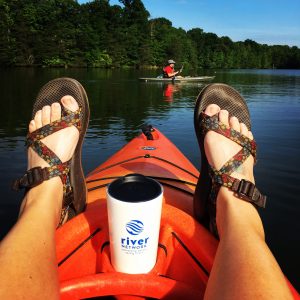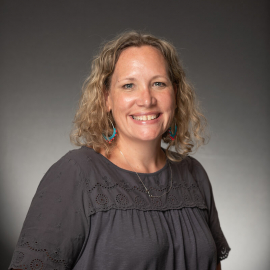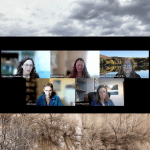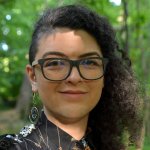April Ingle
Originally from Indiana, April Ingle (she/her) now lives and works in North Carolina, on Sissipahaw, Occaneechi, and Keyauwee lands.
April joined River Network in 2016. As River Network’s Vice President of River Programs, she works with the River Network team to design and deliver programs to support the Network’s efforts to ensure Healthy Resilient Rivers, Safe and Affordable Drinking Water and Climate-Resilience for their communities.
Prior to joining River Network, April was working as a full-time consultant after serving as Executive Director of Georgia River Network for 11 years. Prior to Georgia River Network, April worked as the Public Relations Specialist, then Executive Director of the Indiana Association of Soil and Water Conservation Districts; as Coordinator of the St. Joseph River Watershed Initiative; and as an environmental educator. April has Bachelor of Science Degree from Purdue University’s School of Agriculture. Outside of work, April is spending time with her family, taking walks with her family’s dogs, hanging out at the neighborhood pool, cooking, or planning/dreaming about her next travel adventure.
Which River Network value most speaks to you?
Strength. I love working on behalf of this amazing network of folks who continue, after so many years, to connect, unite, and learn together to reach common goals and build strength to ensure equitable access to clean, safe water and healthy rivers for their communities.
What motivates you to go to work everyday?
I am motivated to go to work everyday by the thousands of people across this country who are fighting to ensure equitable access to healthy rivers, safe drinking water, and resilient communities.
What called you to work in water?
I am called to work in water by a desire for justice and fairness and to see that people and nature, not polluters, are prioritized and protected.
Why is equity, diversity, and inclusion (EDI) important in your work?
Access to safe, healthy water is a human right, but far too many still do not have that right due to systemic racism, oppression, and neglect.
What was your earliest memory around water?

Relaxing at Oak Hollow Lake in High Point.
Going camping and swimming at Raccoon Lake near where I grew up in Indiana.
If you didn’t work in water or conservation, what would you be doing?
In retirement, I hope to travel the world and make lots of art.
How do you think the conservation community can make the biggest impact?
By working to ensure that the huge investment in water infrastructure by the federal government is distributed equitably and the funds benefit communities that have been neglected for far too long.
How do you recharge outside of work?
I love to hang out at the neighborhood pool, try new recipes, spend time with my family, and travel near or far.







